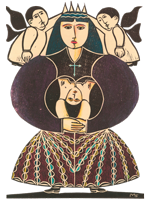 |
|||
 |
Online Catalog Start Shopping Here |
||
 |
Day of the Dead Choose From a Wide Variety of Items | ||
 |
Fundraising site for Central Texas Food Bank |
||
 |
WEB SALE Discount Prices on These Closeout Products |
||
| Fair Trade And Ethical Sourcing |
|||
|
|||
(Continued from previous page)
A Love of Collecting
He spends about a third of the year traveling abroad to pick out his stock--mainly in Peru and other Latin American countries and in Indonesia--and much of the rest of the time managing a business that employs 20 people locally and a hundred artisans all over the globe. In addition to the store at 209 Congress Avenue, Tesoros' wholesale business is one of the largest in the country that deals in Latin American crafts. Williams loves to show off the things he's accumulated. Like the house he's restoring to its l9th-century glory for his wholesale operation, or the Peruvian Quechua Indian monkey cups he keeps at home in his vast personal collection of folk and fine art artifacts.
Tesoros Helps to Preserve Native Arts and Artisans
This fondness for character and tradition has led to an abiding concern for the fate of native crafts in the world's poorest regions. Williams graduated from the University of Texas Latin American Studies program in 1983, specializing in anthropology and economics, and curiosity and conscience remain strong intellectual habits for him.
Every few months he brings a visiting artist or lecturer to Tesoros. Peruvian retablo-maker Nicario Jimenez demonstrated the construction of his little tableaux in-a-box accompanied by traditional Andean music and food on Peruvian independence day. Renowned Brazilian poet and print-maker Jose Francisco Borges did a workshop and showed off the booklets he writes, illustrates and prints entirely by hand.
Williams says these visitors--and almost everyone with work for sale in his store--represent a tradition whose viability in their own countries is waning. Borges is an excellent example. Like Mexico's great social chronicler Jose Guadalupe Posada, Borges' woodcuts and folkish writings provide witty, incisive commentary on Brazilian daily life and, at pennies apiece, are available to people at all levels of society. Nowadays they're little read, however, because of the inroads of radio, television and film. Williams points out that this is happening all over the world, with troubling consequences for traditional crafts. "Domestic uses have disappeared. In Teotitlan (near Oaxaca in Mexico) they wove traditional serapes and ponchos, and people don't wear them any more. They have to have other outlets for their weaving, and that's where the importers and tourists come in because they've kept alive some of those traditions."
Williams' graduate thesis was about what happens to folkways as the outside world intrudes and commercialization sets in, and he wants to do what he can to promote crafts in their most traditional forms. He works directly with artisans in remote areas, sometimes with whole families, like the 78-year-old Peruvian painter of saints and his son and grandsons. Their production goes almost entirely to Tesoros.
Helps Revive Economies
He is also active in international organizations that work to maintain, and in some cases revive, local crafts economies. One of these is Aid to Artisans, a Connecticut-based, non-profit group supported largely by the U.S. government's Agency for International Development, which gives money and design and marketing advice to individuals and crafts co-operatives. Williams says, however, that he is often at odds with Aid to Artisans because it focuses merely on the creation of jobs at the expense of craftsmanship and cultural preservation.
Clare Smith, the organization's director, gracefully disagrees. "I adore Jonathan," she says. "He's the conscience of the organization. Just creating jobs wouldn't be (what we do). We may not be as interested as Jonathan in preserving traditions, but we do want to preserve their vitality. I wouldn't mind changing the shape of an ancient and honorable basket for an American market, as long as the traditional one was still being made. I see it as a parallel."
Another group he works with is Nicaragua's private, non-profit Pro Arte. Nicaragua used to have a vigorous crafts trade with Cuba, he explains, but the economy was decimated by the United States' clandestine war against the leffist Sandinistas, and Cuba's own worsening economic situation eliminated its remaining market. "At one time we had an embargo... Remember in the 80s when (President) Reagan was saying...that at any moment these hordes of Nicaraguans were going to invade? You go there and think, what are they going invade on, their donkeys? It's such a poor place, and it got poorer and poorer because of our policies." Williams feels an obligation to help rebuild what the United States was instrumental in destroying, and through Pro Arte he imports pottery and hammocks to sell at Tesoros. He also acts as an intermediary to ship Nicaraguan crafts to other North American businesses, which he says he does more to help the Nicaraguans than as a profitable business proposition.
Which is not to say that the unpleasant consequences of American foreign policy are his only concern. He also involves himself in the cultural life of Austin, loaning several retablos from his collection to a show this year at MexicMuseum, for example. Herlinda Zamora, who was the interim director speaks glowingly of Williams' participation. "Not only did he have Mexican retablos, but he had others from all over Latin America, things that I didn't even know existed," she says. "I was impressed by his knowledge of Latin American folk-art."
When he was still a UT student, Williams started importing Peruvian handknit sweaters as a way to make some money while he tried to finish his thesis. He didn't have much of a fashion sense, as it turned out, and he changed his focus to folk art, particularly Peruvian weavings. In 1987, he became partners with Charles Lewis, one of Austin's original folk art importers, and by 1989 he had his own store.
Tesoros is now one of a number of folk art importers in town, like El Interior and the Turquoise Door, although each has a different emphasis. Some deal more in furniture and jewelry, others in Native American as well as foreign crafts. What distinguishes his store, Williams says, is the wide range of countries he represents and his frequent programs. He considers El Interior to be his main competition, and the store's owner, Marcia Lucas, agrees. But, she says, "I've been around a lot longer. I have been focused on Mexico, Guatemala and the Caribbean. Williams has tended to focus on South America and Peru."
It seems everyone in the business lays claim to dealing with the most traditional work. Whatever the merit of these assertions, it's clear that Williams' devotion to hand-crafted exotica and the people that make it is deep and genuine. "I think it's fun to sell $2 items as well as $200 items," Williams says. "A lot of it is introducing people to different cultures that they're not used to."
"Tesoros" and "Tesoros Trading Co." are Registered Trademarks.


